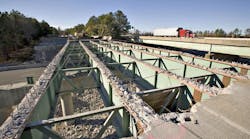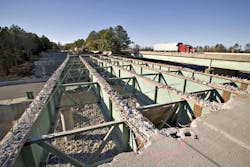This is no doubt a ticklish and often very sore subject for many readers, especially truckers, as many are convinced (with good reason) that fuel taxes already generate plenty of money – it just must get spent more wisely.
For example, C. Kenneth Orski– a noted public policy consultant and 30-year veteran transportation expert – noted in his coverage of the latest Congressional hearing on the state of the Highway Trust Fund (HTF) late last month that a six-year transportation bill would require roughly $320 billion or $53 billion annually to maintain current spending levels, yet HTF revenue and interest over the same period are only expected to bring in some $240 billion, according to the Congressional Budget Office (CBO); leaving an unfunded shortfall of $80 billion.
“Even a stop-gap one-year bill would require an extra $15 billion and increasing amounts in subsequent years to prevent future shortfalls if spending was maintained at the 2013 levels,” Orski said.
But is John Q. Public willing to pay more in taxes to support such increased HTF expenditures? Let’s see what MTI’s survey – saddled with the unbearably clunky title “What Do Americans Think about Federal Tax Options to Support Public Transit, Highways, and Local Streets and Roads? Results from Year Four of a National Survey” – purports to reveal."A number of the results may surprise legislators," noted Asha Weinstein Agrawal, PhD, (seen at left), director of the MTI’s National Transportation Finance Center. “Some taxes received very little support, while others are far more acceptable. For example, a ten-cent gas tax increase to support undefined transportation needs received 23% support. But if it was spread over five years, it received 40% support."
She added that increasing the gas tax rate had significantly more support if people received more information about how the revenue would be used as compared to an increase to be spent for undefined transportation purposes.
“For example, [we] found much stronger support if the funds are to be used for highway maintenance or air pollution mitigation,” Agrawal noted. “This was true for every demographic surveyed.”
MTI’s survey – conducted by the Social Science Survey Center at California State University, Fullerton, and polling 1,501 adults nationwide by telephone in either English or Spanish between March 4 and April 4 this year – found that a majority of Americans would support higher taxes for transportation but ONLY under certain conditions.For example, the researchers found that a gas tax increase of 10 cents per gallon to improve road maintenance garnered support from 67% of respondents, but quickly dropped to 50% if the revenues were to be devoted to reducing global warming and then plummeted to just 23% if the revenues were to support “undefined” transportation purposes.
As for tax options where the revenues were to be spent for “undefined” transportation purposes, pollsters fond support levels varied considerably by the type of tax proposed, with a sales tax much more popular (58%) than either a gas tax increase (24%) or a new mileage tax (19%).
Another interesting facet of MTI’s survey centered on comparing public support for two alternative versions of the mileage tax and eight versions of a gas tax increase.
In this scenario, variations on the two taxes increased support substantially over that for the base case of each (a flat-rate mileage tax of one cent per mile and a 10 cent per gallon gas tax increase proposed without any additional detail) with such “boosts” in support ranging from a low of 17 percentage points to a high of 44 points.
It’s interesting to note, too, that MTI tested 11 different tax options via this survey – eight variants of a gas tax increase, two variants of a new mileage tax, and one new sales tax option. MTI’s Agrawal stressed, too, that when interpreting the survey results, it is important to keep in mind that the questionnaire described the various tax proposals “in only general terms,” she said, so the results cannot be assumed to reflect support for any actual proposal put forward.
Nevertheless, Agrawal thinks the results show likely patterns of support and, more importantly, the public’s likely relative preferences among different transportation tax options.
Here are some other interesting finds from MTI’s survey:
- Of those 11 different transportation tax options presented, six had majority support.
- Linking tax increases to safety, maintenance, or environmental benefits substantially increased support among virtually all socio-demographic groups.
- Support levels varied considerably by the type of tax. When taxes were described with no information other than the tax type, a new sales tax was much more popular than either a gas tax increase or a new mileage tax.
- Some 80% said that better transit is an important priority for their state.
- The majority did not support increasing gas taxes or transit fares to improve transit, but 64 percent supported spending current gas tax revenues on transit.
- Less than half the respondents – 46% – understood the federal government's role in funding public transit.
"For example, support increases when revenues are dedicated to specific purposes popular with the public, when the tax increase is spread out over several years, or when information is provided about how much the increase will cost drivers annually,” Nixon (seen at right) pointed out.
In addition, stressing the environmental, safety, and maintenance benefits will increase support for transportation taxes, including those for transit, she added, while devoting revenues to maintenance and safety can increase support levels substantially across the entire population.
Also, linking a transportation tax to environmental benefits can strongly increase support among most population subgroups, while linking transit with environmental benefits may be a particularly successful way to increase support for transit revenues, Nixon emphasized.
Still, raising transportation-related taxes of any sort remains a hard sell not only on Capitol Hill but for U.S. citizens, too – requiring new funding approaches, mayhap.
That subject, however, must wait for another post on another day.







